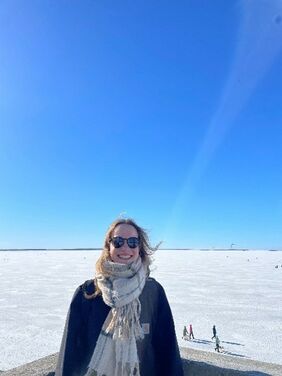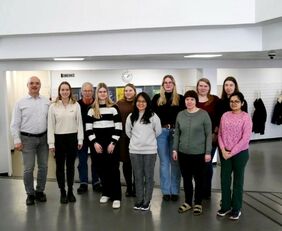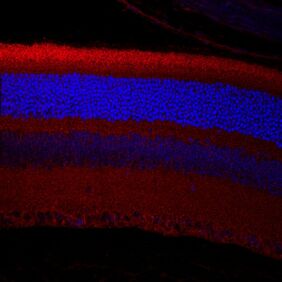Jena.“I was very excited about the idea and wanted to take the opportunity to have this experience,” says Sarah Naumann about her internship in Finland. Sarah is currently in her third year of training as a biological laboratory assistant at the Leibniz Institute on Aging – Fritz Lipmann Institute (FLI) in Jena, currently working in the research group of Prof. Dr. Helen Morrison. She recently completed a six-week internship at the University of Oulu, specifically at the Faculty of Biochemistry and Molecular Medicine in the "Disease Network" division within the research group of Alexander Kastaniotis, PhD. The international internship was funded through the EU's Erasmus+ program.
Sarah's goal was to gain insight into different laboratories, work practices, and organizational structures. She found the challenge of working in an unfamiliar environment with new colleagues exciting. “I saw this as a chance to grow, strengthen my personal responsibility, and learn more in the scientific field,” she explains. Sarah was also drawn to the idea of discovering a new country, a new city, and meeting new people.
But how did she end up in Finland, of all places? Before planning the internship in detail, Sarah was asked if she had a country preference. Since this was only the second time such an internship was offered to trainees at the FLI, there were no established partnerships or contacts to rely on. This meant Sarah had more or less a free choice. She suggested several countries with universities and institutes that personally interested her, including Finland. “Although Finland was one of my top choices, it was ultimately due to chance that I ended up there. Unfortunately, we received little to no responses to our internship inquiries at the preferred locations,” Sarah explains. Further contacts eventually led to Alexander Kastaniotis and his research group, who were very committed and made the internship possible.
The language barrier was very low, as Sarah reported, since most people at work spoke very good English. Even outside of work – such as when shopping – she was able to communicate in English without any problems. A few useful Finnish words stuck in her memory. “For example, kiitos – thank you, or moi – hi. But I also remember random words like kukka– flower, muna – egg, or lentoasema – airport.”
In general, Sarah found the Finnish language challenging for foreigners, as the words have a rather unnatural spelling and pronunciation for German speakers. “Also, everyday Finnish doesn’t always match the language you find in dictionaries,” she noted.
The internship abroad helped Sarah Naumann grow significantly – both professionally and personally. “I find it very valuable to have seen different ways of working, lab setups, and organizational structures. It gives me the feeling of being able to think outside the box.” Because the research group she joined had a different focus from her group in Jena, she was able to broaden her scientific knowledge, gain insight into new research topics, and meet many new people.
Since almost everything during the internship was conducted in English, with only a few exceptions, Sarah also improved her English skills. “I also developed on a personal level because I was pretty much on my own there.”
Sarah found the work environment at the Finnish university very pleasant. “I actually looked forward to going to the lab. My colleagues were open and friendly, so we quickly got along well and even had fun at work.” Even those with whom she had little direct contact were always helpful.
Some things, however, were handled differently compared to Germany, which Sarah found very interesting. “Many things appear similar, but in my opinion, they’re still not really comparable,” she said.
Overarching structures were alike – for example, both the Finnish university and the FLI have various core facilities, such as animal facilities or mass spectrometry and sequencing services. “But when you look closer – especially at everyday work in the lab – there are more significant differences,” Sarah explained.
For instance, waste disposal and autoclaving were managed differently, and it wasn’t common to have a dedicated technical assistant (TA) in every research group, as is often the case in Germany. “I recognized many of the same lab techniques, but they were carried out differently.”
During her internship, Sarah worked closely with another intern from the Netherlands. “Over time, we also became friends, and we still keep in touch now and then.”
Outside of work, Sarah had time to explore the city of Oulu – Finland’s fifth-largest city – visit some sights and make new friends. “I also tried out countless cafés, sometimes even with my colleagues. Since Finland ranks first worldwide in coffee consumption, it was kind of inevitable,” she said with a smile.
She also went to an ice hockey game and took a snowboarding trip to a nearby ski resort. “One of my personal highlights was walking on the frozen sea. In general, I really enjoyed experiencing a ‘real winter’ again, with lots of snow over an extended period. Unfortunately, I didn’t get to see the Northern Lights,” Sarah said with regret.
Her conclusion upon returning to the FLI is a clear recommendation to other trainees to do an internship abroad: “It’s a great opportunity to experience a different work environment and learn new methods. I really value getting to meet new people and different personalities. From a professional perspective, I learned a lot. And personally, you grow – because you have to take initiative and take responsibility.”












